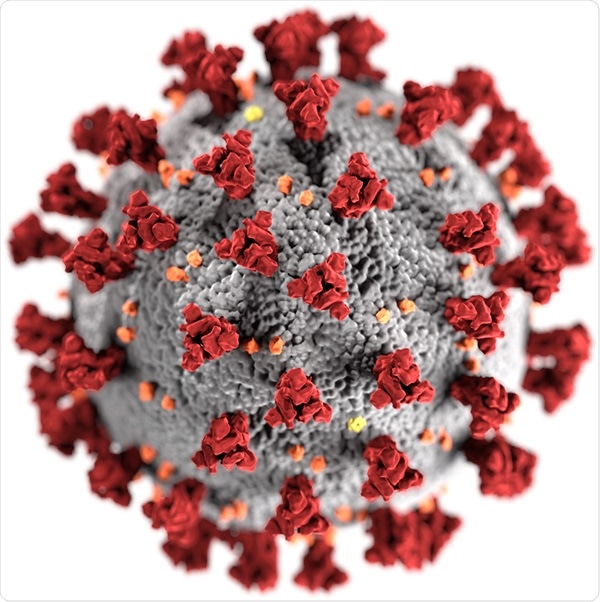Some patients infected with the novel coronavirus may experience only mild symptoms, while others may need medical care due to severe illness. People who are at a high risk of developing severe coronavirus disease (COVID-19) include older adults and those with underlying health conditions. However, severe disease has also been seen in young people with no underlying disease.
Now, a blood test can help predict COVID-19 severity in infected patients, as described in the journal Cell Systems.
A team of scientists at London, England's Francis Crick Institute and Germany's Charite Universitaetsmedizin Berlin has shown that certain chemicals present in the blood of patients infected by the novel coronavirus can predict whether they will develop severe disease.

Image of the ultrastructural morphology exhibited by the 2019 Novel Coronavirus (2019-nCoV) (CDC) - CDC/ Alissa Eckert, MS; Dan Higgins, MAM / Public domain
Protein biomarkers
The team has found 27 key proteins in the blood of those infected with the severe acute respiratory syndrome coronavirus 2 (SARS-CoV-2), the virus that causes COVID-19. They used these proteins as predictive biomarkers of how ill a patient could become due to the viral infection.
To arrive at their findings, the researchers polished an analysis method known as mass spectrometry to rapidly test for the presence and level of various proteins in the blood plasma. Developed at the Francis Crick, the platform was applied to evaluate and study the serum of 31 patients with COVID-19 at the Berlin University hospital Charite.
The results were validated and confirmed in 17 COVID-19 patients at the same hospital and 15 healthy controls.
Of the 27 key proteins detected, three were tied to interleukin IL-6, a protein that triggers inflammation and a known marker for severe symptoms. The team also suggested that treatments may include drugs that can target these proteins, to alleviate some coronavirus symptoms.
Developing a protein biomarker test
The biomarkers could also help in the development of a test that can help predict how ill a patient might get when infected with the virus. Further, it can help provide new targets for developing potential therapeutics for the deadly disease. The results of such tests could guide clinicians in deciding what treatment to give.
Patients with COVID-19 respond differently to the illness, with some developing no symptoms at all, while others suffer a fatal infection. A test that can help doctors predict the severity of illness is vital.
"A test to help doctors predict whether a COVID-19 patient is likely to become critical or not would be invaluable. It will help them make decisions about how to best manage the disease for each patient as well as identify those most at risk. We hope the biomarkers we've identified will lead to the development of these vitally needed tests," Christoph Messner, one of the lead authors and postdoc in the Molecular Biology of Metabolism Laboratory at the Crick, said.
The researchers also hope that the robust method they have used in the study can be applied to other diseases. Also, they added, even if the method was not explicitly developed for COVID-19, it has proven highly valuable to gain new insights into the disease.
The coronavirus pandemic has now infected more than 6.5 million people worldwide, and the death toll has topped 385,000. Of those who had been infected, more than 2.80 million have already recovered.
The United States is the hardest-hit country, with more than 1.85 million confirmed cases and at least 107,000 deaths.
Brazil follows the U.S. with more than 584,000 people infected with SARS-CoV-2, and a death toll surpassing 32,000. Russia, the United Kingdom, and Spain report high infection rates with 431,715 cases, 281,270 cases, and 240,326 cases, respectively.
Some countries report high fatality rates due to an overwhelmed health care system and the uncertainties of the viral infection. Having a simple blood test to determine who is at high risk will help reduce the number of deaths tied to COVID-19.
Sources:
Journal reference:
- Messner, C., Demichev, V., Wendisch, D., Kurth, F., Sander, L., Ralser, M. et al. (2020). Ultra-high-throughput clinical proteomics reveals classifiers of COVID-19 infection. Cell Systems. https://www.cell.com/cell-systems/pdf/S2405-4712(20)30197-6.pdf?_returnURL=https%3A%2F%2Flinkinghub.elsevier.com%2Fretrieve%2Fpii%2FS2405471220301976%3Fshowall%3Dtrue